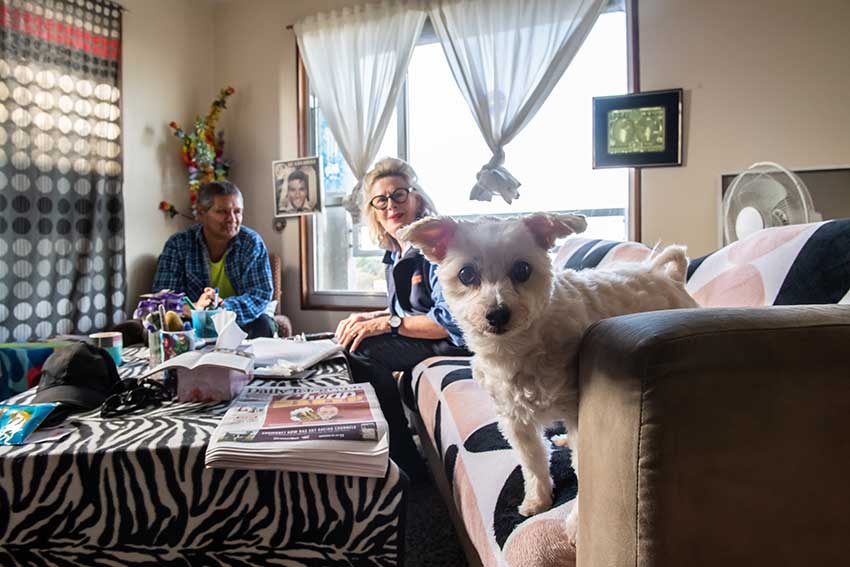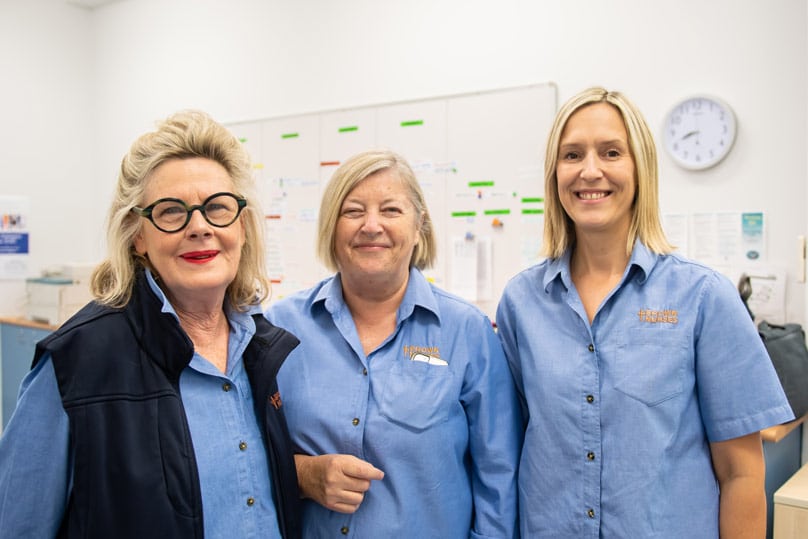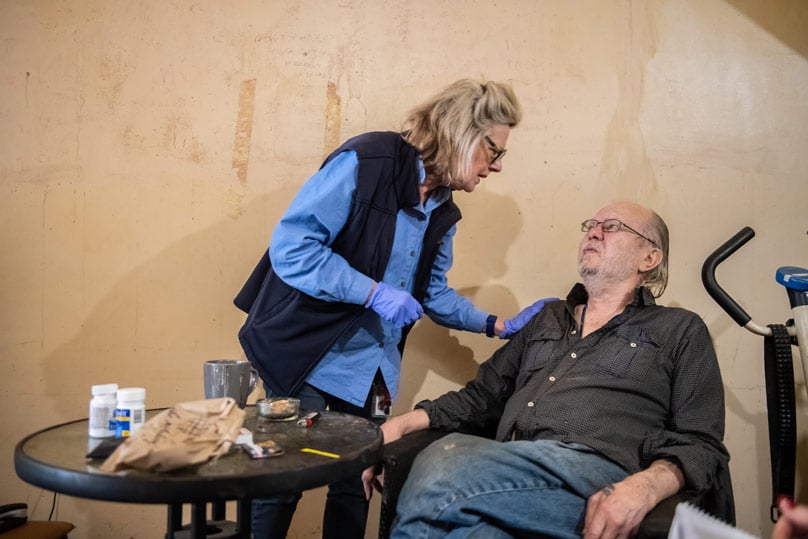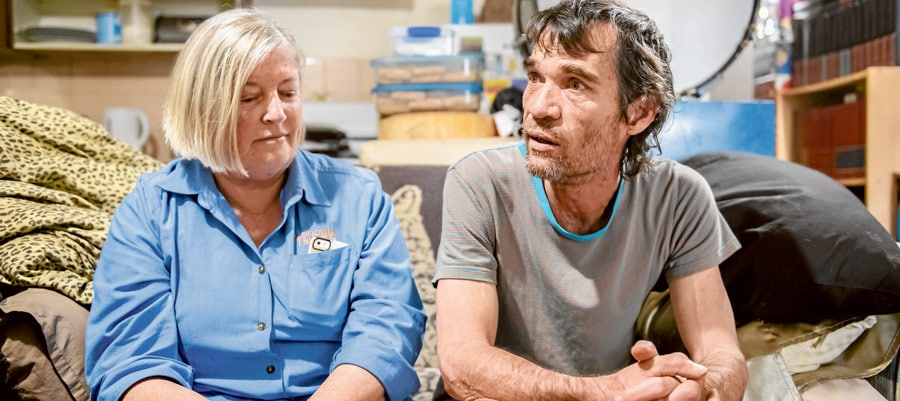
Tom lives alone. His only companion his severe mental illness. The walls in his Darlinghurst flat are covered in mould and the stench of cigarettes, urine and sheer filth slaps you in the face.
He is usually quite irritable and cranky and goes weeks on end without showering. He has advanced glaucoma and without daily drops risks what little eyesight he has left.
One of Sydney’s lost generation, Tom has fallen through the cracks of welfare and forgotten by just about everyone … except the Brown Nurses.
An independent ministry of Our Lady’s Nurses for the Poor, the Brown Nurses were established in 2008 to carry on the legacy of Australian saint-in-waiting Eileen O’Connor and the order of nuns who share a deep devotion to Our Lady and to the sick and poor, but are now unable to carry on the work due to a dwindling and ageing population.
Related Stories:
Former Eileen’s Nurses head returns to God
Monica Doumit: Why Eileen is exactly the saint Australia needs
Our Lady’s Nurses for the Poor congregation leader Sister Margaret Mary Birgan oln, said their mission of providing care remains as important today as it’s ever been.
Living by Eileen O’Connor’s mantra: “You will always find Jesus most at home in the poor and the most broken”, the sisters are proud to continue their work for the downtrodden.
“The Sisters continue to assist the sick and poor in Sydney, Newcastle and Macquarie Fields and with our ministry of the Brown Nurses we continue our mission to serve in the spirit of our founders and sisters,” she said.

“The Brown Nurses are an independent ministry and funded by the good will of people who have generously given their wealth and time.
“We have never asked for government funding. Our Father Founder, when asked by the Archbishop how the work would be funded, Father’s reply was ‘If the nurses look after the poor, God will give the crust”.
And give the crust he has. Today, the mission of the Brown Nurses continues. Nobody is turned away.
Referrals for the service come from a variety of sources including general practitioners, hospitals, shelters and even those the nurses meet on the streets.
Director of Services Wendy Peddell said “being precious about getting your hands dirty – literally and metaphorically – doesn’t exist”. If getting down on all fours to drag rubbish out from under a bed, clean a toilet or clean up after a dog that has not been taken outdoors or deal with an infected wound, which has not seen air or water for weeks on end is required … then that’s what is done.
Ms Peddell said it’s about meeting a person on their level and with an attitude of genuine respect: “You just have to keep a poker face whatever comes out from under the bed.”
Brown Nurse Mary has been with the ministry for 10 years and admits she “has seen it all”.
In her mid-60’s, the warm and friendly caregiver said despite the filth and squalor, she couldn’t imagine doing anything else.
She knows that for most of her clients she or her fellow nurses are their last hope.
“If you had told me 40 years ago while I was studying nursing at St Vincent’s I would be cleaning toilets, wiping walls, adopting pets after their owners had passed away I would have just laughed … but here I am,” she said.
“At the core of nursing is compassion, and that is what the Brown Nurses are all about.
“We see some pretty sad, terrible cases, some of our clients really are at the end of the line, but if we aren’t here, who will look after them?
“It can be an incredibly tough job but then also very rewarding.
“Patience and persistence rank very highly within our team of nurses as long-term neglect can’t be undone overnight.
“The look on the faces of our clients when we arrive is why do we do it, at times we can be the only visitor they get and while they mightn’t always show it we know they appreciate us.”
Tom is one of Mary’s daily visits. She arrives with a piping hot Bourke Street pie, medication and a smile. A man of few words, Mary is typically greeted with a grumble and a harsh word.
“Mary’s alright,” Tom grins when she arrives with The Catholic Weekly in tow. “She does my drops and is always at me about having a shower but without her I’d be dead, I know that.”

The clothes Mary put out for Tom have been sitting on a pile for two weeks and she doesn’t see that changing any time soon.
Next on her list is Eugene. Known as the “happiest man in Waterloo”, the deaf indigenous dog-lover lives in a high-rise social housing tower and receives a weekly welfare check.
Relatively self-sufficient, he needs assistance with managing bills and making phone calls.
During the 15-minute visit, Mary discovers his stove isn’t working and logs a call to have it repaired.
She knows it will take weeks, but you have to start somewhere, she shrugs.
Next is Indian-born Rajesh, a chef who was found to have overstayed his visa and was impounded in the Villawood Detention Centre for two-and-a-half years in 2005.
The experience left him with severe mental health issues and a number of addictions. Afraid to leave his tiny Surry Hills unit following a recent murder in the next door apartment, Mary is trying to get him re-housed and out of the environment which feeds his addictions.
“She is a saint, they all are,” Rajesh beams when asked about Mary.
“They show us respect and love. Without them I don’t know where I’d be. They come in here and give me my medication, clean my house and listen to me.
“I love them from my heart.”
While talking, Mary has disappeared into the bathroom, and quietly cleaned his toilet and taken out the rubbish, which is overflowing and infested.
Mary admits it’s because of people like Rajesh that she continues.
Growing up a Catholic taught her about her faith, but living it and carrying on the work of Australia’s next saint-in-waiting is what keeps her doing it.
“These people need someone, and that someone is us,” she said.
“There is no other service that does what we do, we enable these people to stay in their homes, no matter what that looks like.
“The squalor, the muck and dirt is what you see on the outside, we are so fortunate to get a look at what goes on inside.”






